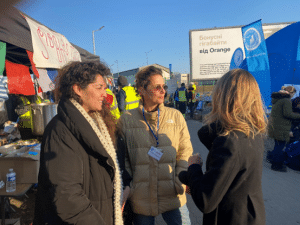1. The Israel department of labor and statistics.
ISRAEL CAUSES
Michal Dolev Hashimshony and Engineers Without Borders rise to the challenge in Ukraine
When Michal Dolev Hashimshony arrived at the Ukraine border, she witnessed a chaotic scene with thousands of Ukrainian children and woman crossing the border into Poland. Once she realized that there were no counseling or support services to help them process their situation and decide what to do next, she knew that she had to build a solution.
By Israel Legacy Central
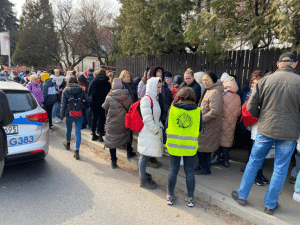
Just a few years ago, Michal Dolev never could have imagined that her work would bring her to the epicenter of the Ukraine refugee crises. At the time, Michal was running a large research project on water technology and sustainability in communities in Africa as part of her master’s degree in engineering and sustainability.
“I was working in Tanzania and Kenya and one day, I run into this simple yet amazing structure near my worksite. I had no idea what it was, so I asked. They told me it was that it was a rain harvesting system constructed by Israelis. I was shocked. What do Israelis know about Africa?”
That’s how Michal came to know of Engineers Without Borders – or EWB – a nonprofit that sends volunteer engineers to the far reaches of the world to help improve lives.
Once her project ended and she had returned to Israel, she immediately tried to contact EWB’s Israel team, which were strictly volunteers. “It took them six months to return my messages. I think they only called me back because they realized I wasn’t going to stop calling,” explains Dolev. “After Africa, I had already decided that I wanted to something new. Something bigger where I could make an impact. And I wanted to do it with EWB,” explains Doval.
Just a few months later, Michal was the new CEO of EWB’s Israel national chapter, where she quickly raised new funds to enable EWB to hire its first employees.
War Breaks Out
As the war in Ukraine worsened and a humanitarian crisis unfolded, Michal began exploring what to do. Because EWB did not operate an Eastern European branch near Ukraine, she decided to reach out to every NGO she knew in Hungary, Poland, and Romania to see what they were doing about the crisis.
“Everyone was moving very slowly. The NGOs in Europe didn’t have much planned. I wanted to move fast,” says Dolev. Soon, she began receiving calls from different NGO’s and groups in Israel – doctors, lawyers, social workers, trauma specialists – asking her what she was going to do.
“I decided to reach out to Topaz-Tikkun Olam and NATAN, two NGOs with deep experience working in crisis disaster situations. After some quick back and forth, we agreed on the next step – we needed to assess the situation on the ground in Poland.”
Arriving in Poland
That same week, Michal and her new team were on a plane flying from Tel Aviv to Warsaw. Their plan was to rent a car and drive to Kraków, which is only 250 km from the border.
But upon arrival to Warsaw, they hit their first road bump as there were no rental cars available anywhere in Warsaw.
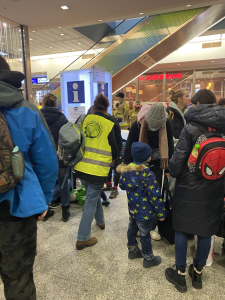
“I called this local NGO – a church that was helping Ukrainian refugees – to ask them what to do. They were so excited to hear from us – I think mostly because we were Jews from Israel who had flown to Poland to help out – that they came to pick us up right away. We ended up donating the money for the rental car to the church.”
Getting to the Border
With their new guide leading the way, the team arrived to assess the situation and understand how the city was managing this massive influx of 1.6 million Ukrainians.
The first stops included the shelters and train stations that had been converted into refugee stations.
“The city was filled with makeshift tents and unbelievably long lines, like what you might see at a concert. It was like nothing I’d ever seen.” Next, she met with city officials to better understand what was planned to support the city’s infrastructure and quickly changing situation.
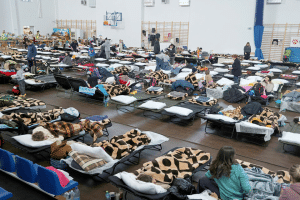
After two days in Kraków, the team finally arrived at the Poland-Ukraine border. “It was pure chaos,” says Doval. “There were thousands of children and woman walking, many with their pets. One lady had a table where she was giving away pies. A booth nearby had a group of musicians playing jazz.
Michal then recalls hearing something else unexpected.
“All of a sudden, I hear people shouting in Hebrew. As I turn, I see a couple of Israelis, one shouting to the other, ‘Help that woman there in a wheelchair, her husband was killed 2 hours ago, and her leg is broken.’ I was surprised to hear Hebrew. But you adjust to the situation really quickly.”
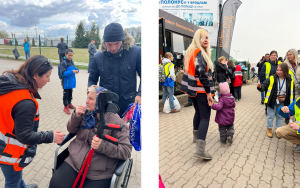
The next day, still led by their guide from Warsaw, the group then visited nearby shelters that were serving as refugee camp that had thousands of people, mostly on cots lined in rows. Doctors were working at a dizzying pace next to kids playing.
“When I arrived to the border, I hear two Israelis shouting to each other. I was surprised by how many Israelis were already at work.”
A Risk for Woman and Children
Near the border, people were holding up welcome signs saying, ‘Stay with us In Italy’ or “Come to England” or “a family in Switzerland welcomes you.” While most of the invitations were authentic offers to help, there is a real risk from human traffickers.
“The women were arriving completely exhausted,” say Doval. “They had been walking for days. Many of them just needed to be able to slow down and relax, think through their next steps, and make the right decision about what to do next. ”
Without any overseeing the situation, there was a real risk that women and children accepted the wrong decision.
That’s when Michal had her first brainstorm.
Finding a Solution
“After half a day at the border, it hits me. These women and children are exhausted and a lot of them are in a state of shock, understandably. They need a place where they can slow down for a moment, speak with someone, and come to terms with what’s happening. They need guidance on how to decide what to do next.”
Because EWB are engineers, Michal knew that the best approach was to focus on building a support structure that would enable the other NGOs – the doctor and social workers – to make it happen.
The team got together and began to sketch it out. A mobile counseling center that could be quickly put up and then taken down, if needed, to move it to a new location. The refugees were moving from place to place, and the situation was constantly changing.
“The first wave of people out of Ukraine knew where they were headed – they had a job in England or someone waiting for them in Holland. But the second wave of people had no idea what there were going to do,” explained Doval.
Back to Israel
After a few days, the team headed back to Israel so that they could focus on building a plan – and getting the resources needed to implement it.
“We knew that we needed to build a structure that was inviting and comfortable. The woman needed a place that they trusted and could spend 10 or 20 minutes to relax and receive counseling. The focus was woman who were in a state of shock – you could see it in their eyes.”
The plan they put together called for each refugee camp to have 1 mobile counseling center that would be owned and operated by that location.
Once the initial plan was in place, Michal came up with her second brainstorm.
“We wanted to help track the woman after they left the border area. Nobody knows where they are going. So we decided to build a mobile app that would allow people to let us track their location and, if they want, click a “Help” button to alert us.”
What’s Next
Next week, Michal plans to return to the Ukraine-Poland border and start the roll-out of the mobile counseling centers. The plan was to have 1 unit standing the following week and then 4 units operated by 2 different teams within the next two months.
There was a massive demand for social workers, doctors, and caregivers and the need will continue to grow. Michal’s plan is to keep growing our program.
“In the early phases of a devastating situation like this, it’s really the small NGO’s that take the lead. We’re designed to move fast and get things done now. At some point, the bigger NGO’s like the Red Cross will take over,” explained Dolev.
In the meantime, Michal and her team are working in hyperdrive to get the mobile centers up and running.
“When you arrive to Poland as a refugee, they give you a bracelet with a code to wear. You get this as a refugee. Although I was not a refugee, I also received one – and I’m not taking it off until I get back.”

Lorem ipsum dolor sit amet, consectetur adipiscing elit, sed do
Read our StoryStay Connected
Get our latest updates monthly in your inbox





